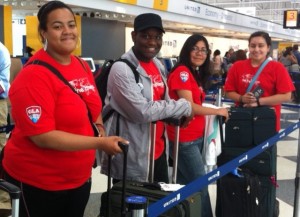 Is it necessary to hire a tutor if your child is enrolled in a Chinese Immersion program. The short answer to that question is “no” the best answer to that question is “YES!!! YES!!! YES!!!”
Is it necessary to hire a tutor if your child is enrolled in a Chinese Immersion program. The short answer to that question is “no” the best answer to that question is “YES!!! YES!!! YES!!!”
As monolingual parents of bilingual children it is unlikely that our children are exposed to Chinese in the home. It is not required to hire a tutor but supplementing your child’s education increases the chances that your child will be confident in speaking their non-native language, receive individualized support, and address any learning needs right away.
I am concerned that families that do not supplement Chinese at home and/or outside of the classroom are less likely to notice delays in their child’s ability to learn and/or retain the non-native language right away, have difficulty providing their children with simple tools and techniques to keep their children interested in learning and on par with their peers, as well as, the added benefit of connecting with a Chinese tutor that will help to explain certain cultural aspects of the Chinese language.
1. Your Child’s Academic Success also Depends on their Chinese
Once a child begins to show some delays in their ability to recognize/write characters or maintain a conversational fluency comparable to their peers it may be too late to seek help. I don’t want to sound like a pessimist but there are a number of reasons why waiting until your child is struggling may be too late. First, while there are numerous resources out there to help you find a Chinese speaking tutor there is no guarantee that the week or month that your child needs support that your schedule or your finances will match the availability of the tutors that you find. Second, when the teacher or your child makes it clear to you that they NEED a tutor how do you really know when your child began struggling and whether or not their confidence and desire to learn Chinese has been impacted by these struggles.
I believe that it’s better to start early. Try out a few different tutors. There are a number of affordable options. 1) While your child is young develop a relationship with a pre-teen that is willing to read story books and sing songs with your child while you are home. As the pre-teen ages they will still allow you a discounted rate and their own maturity level and skill set will increase in the meantime. 2) Utilize a virtual assistant through services like elance.com. You can hire a virtual tutor that will skype with your child two to three times a week for less than $10/hour.
Build the relationship early to find a tutor that is right for your child so that you aren’t forced to scramble at the last minute if your child is experiencing some difficulties. Additionally, it’s an added perk to support your child with extra opportunities for reading, writing and speaking Chinese outside of the classroom. They can only benefit from the experience.
2. Time Flies When you are Learning Chinese
Many parents begin their children in Immersion programs and they know that their child needs support learning Chinese. If at any point a parent sees their child struggling I know that the decision is often made fairly quickly to look for a tutor or additional supplements to support your child. But then time passes quickly – 1 week (waiting on return phone calls), 2 weeks (busy at work), 3 weeks (the teacher hasn’t mentioned anything else), 4 weeks (your child says they don’t like school anymore), 5 weeks (sticker shock), 6 weeks (family members start promoting their school where they promise your child will excel), and the ball keeps rolling.
3. You are a Busy Parent
Supplementing your child’s Chinese by yourself is an incredible opportunity but one that may overwhelm most parents. As a busy parent the best way to supplement your child’s Chinese is to play Chinese CDs in the car. You can get CDs from the school, local library and/or from your local Chinatown retailers. While many parents are opposed to television there are an array of Chinese DVDs that range from popular Chinese children’s songs, Chinese dubbed American movies, etc. Be sure to begin collecting DVDs early and establish a relationship with a retailer. Some of the movies may have poor production quality or might not appeal to your child. Keep trying and find a style that is right for your child.
While many of us will find creative ways to supplement our child’s learning that doesn’t mean that we will ever be able to help them with their Chinese homework. While it is not necessary and most schools but supports in place for monolingual families I strongly recommend hiring a tutor. Educating your child is a one-time opportunity so no regrets.
4. You Can Move Beyond your Own Cultural Group
I don’t know about you but I have always considered myself to have an extremely diverse group of friends. It’s actually something that many people compliment me on. That’s why I was surprised when I realized not one of my friend’s are Chinese. In fact my friends are not quite as diverse as I thought. Very few of my friends are bilingual and even less were born outside of the United States. For families like my own I see the investment in a tutor as an opportunity to begin connecting with a cultural group that I clearly have unwittingly alienated myself from. I anticipate it will be difficult to explain to my child why I am promoting that she learn a set of cultural norms that I am clearly disconnected from. Identifying a tutor early on in this journey helps us as parents to establish relationships beyond our own cultural group.
Outside of developing a relationship with a tutor families can incorporate celebrations of Chinese holidays at home, cooking Chinese foods and visiting Chinese businesses.
5. Staying at the Top of the Curve
While this may not be politically correct I think it’s necessary to add. It’s time for us as African American mothers to embrace the “Lion Mom” inside of us (tigers don’t live in Africa). We didn’t step out and encourage our children to try something new so that they would be “okay” at it. We are pursuing a Chinese Immersion education in an effort that it will provide our children with a stimulating academic environment so that they will reach their full potential.
Staying at the top of the curve sometimes requires a little nudge. Often we don’t have to nudge our children if we start early enough. We really need to nudge ourselves. Nudge ourselves to raise our expectations. Give Kumon a try. During Spring Break consider a science camp. Join a museum and take your child regularly. And don’t forget to read your child a book every night. Start habits for yourself that will ensure you are giving your child the best gifts for their future.
 Do you know a high school student or recent graduate that has a passion for learning languages and wants to immerse themselves in a foreign culture, this program may be for them!
Do you know a high school student or recent graduate that has a passion for learning languages and wants to immerse themselves in a foreign culture, this program may be for them!





